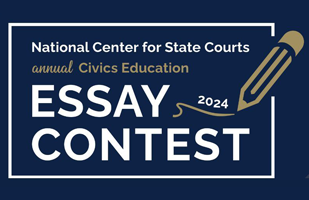Annual Civics Education Essay Contest OPEN NOW


There are three weeks left for students to enter the Civics Education Essay Contest held by the National Center for State Courts.
In the contest’s fifth year, students grade 3-12 are asked to write about the role citizens should play in shaping their communities and government. Participants who thoughtfully address the topic, inspired by former Supreme Court of the United States justice Sandra Day O’Connor, can win up to $1,050.
“NCSC sees the essay contest as a great way for students to share their ideas about how government influences the rights and responsibilities they enjoy every day,” said Molly Justice, the organization’s director of communications and marketing. “Over the years, we’ve been impressed with how students have really thought about our questions and connected them with personal experiences, current events, case law, and history.”
Submissions are judged by the center’s staff and members of the court community based on how clearly students discuss the topic in up to 100 or 250 words, varying by grade. Submissions are due on March 22 by midnight EST and require permission from a guardian or teacher for minors.
“In our work to support state courts, we see the growing need to educate the next generation about the importance of the judicial branch and the impact courts have in our society,” said Justice. “We also hope the contest will help spark students’ interest in public service – whether that’s in the courts, the legal profession, or a related field.”
Last year, Mariam Abaza – then a senior at Dublin Jerome High School in Dublin, Ohio – placed third among her age group in the contest. She discussed students’ First Amendment rights on and off school property, centering her essay around the role of free expression in the American dream.
Doug Stein, civic education and outreach manager at the Supreme Court of Ohio, recommends students entering the contest connect their essay to their own experiences. He says successful entries will demonstrate a student’s understanding of how their own and others’ lives are affected by the government, in particular by the judiciary.


